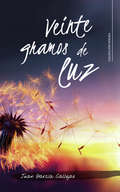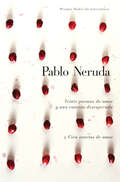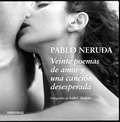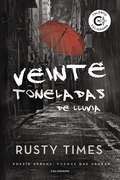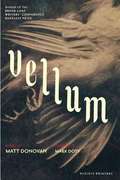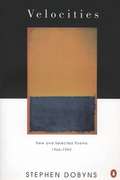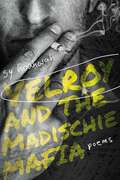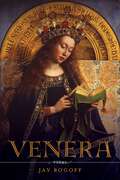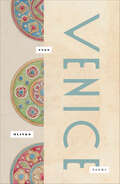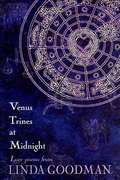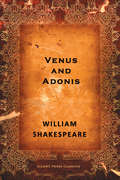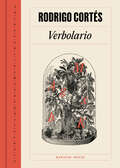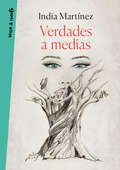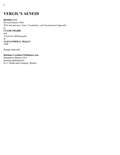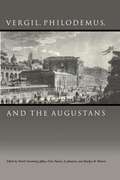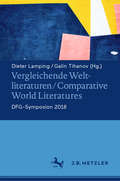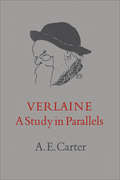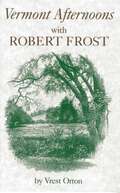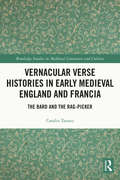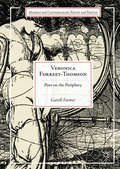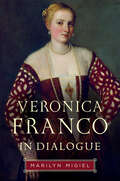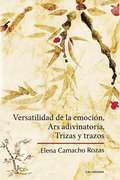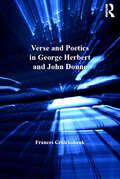- Table View
- List View
Veinte gramos de luz
by Juan García CallejasLa luz es una llaga que no se cierra nunca... En este segundo poemario, después de Tierra escondida, Juan García Callejas nos desvela el valor irrenunciable de la poesía como recurso para alumbrar el discurrir de la existencia cotidiana. Inspirándose en una cita de Christian Bobin y en sintonía con el imaginario de Eloy Sánchez Rosillo, entre otros escritores que laten de forma implícita en su propuesta, nos confirma que la experiencia poética es un acceso posible, y necesario, a la certeza de que la luz pesa siempre más que la sombra. Veinte gramos de luz sigue siendo un canto confiado en que el deseo de ver hace posible el don de la iluminación.
Veinte poemas de amor y una cancion de desesperada y cien sonetos de amor
by Fundación Pablo NerudaPremio Nobel de Literatura “El más grande poeta del siglo xx en cualquier idioma”. —Gabriel García Márquez Un gran éxito desde el mismo momento de su publicación en 1924 cuando el autor contaba con tan solo diecinueve años, Veinte poemas de amor y una canción desesperada causó un fuerte revuelo en la conservadora sociedad chilena debido a su franco retrato de la relación del autor con dos mujeres. Se convirtió inmediatamente en una de las colecciones de poesía más leídas, estableciendo a Neruda como una de las más singulares voces de la poesía en español del siglo XX. Incluso leído hoy, sigue sorprendiendo por su sincera descripción del amor y el sexo. Tan pasional y hermosa como Veinte poemas de amor y una canción desesperada, Cien sonetos de amor incluye algunos de los más sensuales e intensos poemas de Pablo Neruda. Aunque publicada treinta y cinco años más tarde, retiene la ingenuidad y la intensa pasión del joven Neruda, mezclada con la sagaz mirada de un hombre que lo ha visto todo.
Veinte poemas de amor y una canción desesperada: Twenty Poems Of Love And One Song Of Desperation (Biblioteca Edaf Ser. #Vol. 4)
by Pablo NerudaUna de las obras más célebres del poeta Pablo Neruda. «Me gusta cuando callas porque estás como ausente.Distante y dolorosa como si hubieras muerto.Una palabra entonces, una sonrisa bastan.Y estoy alegre, alegre de que no sea cierto.» Reseña:«Neruda significa un hombre nuevo en la América, una sensibilidad con la cual abre todo capítulo emocional americano. Su alta categoría arranca de su rotunda diferenciación.»Gabriela Mistral
Veinte toneladas de lluvia
by Rusty TimesPoesía urbana, poemas que arañan. Poesía urbana, poemas que arañan. <P><P>Por estos poemas vagan amores muertos, perdedores sin esperanza, vagamundos, guerreras con causa, enamorados sin armadura, arañas en la nevera, tumbos, entrañas, oscuridad, alcohol, nostalgia, canciones, anarquía, rebeldes en la ciudad ... y veinte toneladas de lluvia que lo inundan todo. <P>Atraviesa los versos mientras escuchas a tu grupo de rock favorito.
Vellum
by Matt DonovanVellum, the exquisite debut collection from Matt Donovan, meditates on beauty, art, and the violence that is sometimes inherent in both. Here, he juxtaposes religious iconography with stories from history, biography, and personal narrative. In the poignant "Saint Catherine in an O," a knife bears unlikely duality-an object stirring with danger and grace. "A man plays slide guitar / with his pocketknife, accompanying the words of his songs-/ one about light, the Lord moving on water . . . / how blood, he knows, will make him whole. " In other poems, he reflects upon master artists, who captured similar themes in their art though in different mediums. Brimming with poems that are quietly powerful, Vellum marks the arrival of a commanding new voice.
Velocities: New and Selected Poems 1966-1992
by Stephen Dobyns"Stephen Dobyns is one of the very finest poets writing in America today. His poems are brave, ravenous, intensely moving, and utterly his own." - Thomas Lux
Velroy and the Madischie Mafia: Poems
by Sy HoahwahFrom the Comanche Tribal Housing of Madischie in southwestern Oklahoma comes a crew of young Comanche, Arapahoe, and Kiowa toughs hell-bent on gaining power within a subculture of organized crime. Led by a Comanche named Velroy, they find themselves caught in the century-long transformation from the old Comanche Nation to a modern-day casino-owning tribe. Hoahwah relays their story with a distinctive narrative flair, honed syntax, wild imagery, and a splash of lyricism.
Venera: Poems
by Jay RogoffPraise for Jay Rogoff"[Rogoff's] poetry takes a visible art of movement and translates the feelings it evokes and the history it records into delicate words.... But Rogoff also has an amazing knack for the humor in humanity, as a slew of death-defying poems demonstrates." -- Andrew Burstein, The Baton Rouge Advocate"Quite simply, I love the gravitational, poetic pull of Rogoff 's work." -- Renée E. D'Aoust, Notre Dame ReviewThe poems in Jay Rogoff's Venera explore varieties of love, both sacred and profane, by drawing from the natural world, personal intimacy, and the human imagination as evoked in biblical narratives and art. Rogoff reveals how devotion's many guises collide to startle us: a husband consoles his wife after she is awakened by an imaginary child, a man daydreams of his kindergarten crush, Abraham's fear of God perplexes his love for Isaac, and the Virgin Mary, stunned by the angel Gabriel's inhuman beauty, contemplates the decades of purity that stretch ahead.In Venera's title sonnet sequence, inspired by visions of the feminine depicted in the works of Renaissance painter Jan van Eyck, such collisions evolve into collusions. As Rogoff weds elevated language to plainspokenness and sets the erotic alongside the miraculous, the beloved accumulates many identities -- everyone's mother and everyone's daughter, the laboring handmaid and the Queen of heaven, the fertile field and the elusive bride. Rogoff's poems allow us to ponder the contradictory human concoctions of love, detailing how they drive us to venerate the sacred while also submitting to the power of the sensuous.
Venice: Poems
by Ange MlinkoAnge Mlinko alchemizes art and life into a dazzling collection of poetry in VeniceIn Venice, Ange Mlinko dissolves the boundaries between the sublime and the ordinary, the mythic and the rational, the past and the present. She sees a Roman tablet, scratched with Greek script, in the waxen wings of a bouffant bee, and she thinks of the abyss between two airport terminals when considering Rodin’s Gates of Hell. From Naples, Italy, to its sister city on the Gulf of Mexico, or at home, in the glow of a computer screen (“I worry / that Zoom is ruled by djinn / that filter out the wavelength of love / and so I wear my evil eye jewelry, // as you advised, against being too /much in view . . .”), Mlinko probes the etymologies and eccentricities of all she encounters. As Dan Chiasson wrote in TheNew Yorker, “Her extraordinary wit, monitoring its own excesses, is her compass.”On her travels, Mlinko scrapes at the patina of the past and considers the line between destruction and preservation. Sparking with wit and intelligence, the poet’s own lines break down and remake language, myth, and time. Mlinko is a poet of art and of life, and Venice is a sumptuous exploration of poetry’s capacity to capture the miracles and ironies of our times.
Venus Trines at Midnight
by Linda GoodmanLinda Goodman was born on an April day during a spring thunderstorm. In addition to her books on astrology, she published a book in 1990 called Croooerz, which is a brilliant, romantic, semi-autobiographical prose poem. Though she was the most highly-acclaimed astrology writer in the world, her greatest wish was to be known as a poet. With venus Trines at Midnight and the forthcoming Love Poems, she has made use of all her talents within the medium of poetry. And she hopes that people will enjoy these insightful poems and will remember her secret wish.
Venus and Adonis
by William ShakespeareAdonis tragically chooses the excitement of the hunt over the charms of the beautiful Venus.
Verbolario
by Rodrigo CortésRodrigo Cortés regresa a las librerías con Verbolario: diccionario satírico, humorístico y poético, que, con sus más de dos mil definiciones y siete años de trabajo a la espalda, se atreve a enmendarle la plana al diccionario. «Verbolario es un milagro sostenido».Manuel Jabois Toda palabra tiene su significado oculto —su significado verdadero— acechante entre sus pliegues con la astucia del salteador de caminos; se desvela sólo con el uso y sólo ante la perspicacia y el oído, que son el mismo sentido. Rodrigo Cortés reinventa el lenguaje y hace confesar a cada voz su auténtico propósito. Verbolario no define las palabras: las desnuda. La crítica ha dicho:«Selvático y misterioso antidiccionario en que las palabras vuelven a ser territorios a la espera de ser explorados».Laura Fernández «Verbolario es el saloncillo antes de la obra, los camerinos llenos de secretos del diccionario».José Luis Garci «Cortés desvela una realidad que nadie había visto en el lenguaje: las palabras también juegan con nosotros».Jesús García Calero, ABC Cultural «¿Puede un libro ser a la vez diccionario, manual de humor, tratado filosófico y poemario? En manos de Rodrigo Cortés puede».Juan Gómez-Jurado «Con talento y picardía, Rodrigo Cortés logra ponerle a cada palabra de este Verbolario la espina precisa para que el pinchazo nos resulte puñeteramente gozoso».Fernando Aramburu «Enciclopedia ilustrada que mira el mundo con la sabiduría del viejo y la inocencia del niño».Ana Iris Simón «Carcajadas, sonrisas y la leve incomodidad que produce la verdad cuando anda desnuda».Sergio del Molino
Verdades a medias
by India MartínezLa gran artista India Martínez nos muestra en su primer libro sus emociones más íntimas a través un precioso conjunto de textos relatados con sensibilidad y emoción y acompañados de sus propias ilustraciones. «La verdad es muy subjetiva, depende de la piel que la percibe». Bellamente ilustrado por la propia artista, Verdades a medias es una colección de textos poéticos y dibujos en los que la cantante India Martínez indaga en lo más profundo de sí misma y de sus vivencias, transportándonos a su universo más personal. Nostalgia, dolor, amor, fantasía y hondura llenan las páginas de esta declaración de intenciones, de esta rasgadura de alma de la artista, que se desnuda de canción para vestirse de letras y ofrecernos su faceta más transparente y cercana. «Iré dando una de cal y otra arena. Una de voz y otra de música, una de India y otra de Jenny».
Vergil's Aeneid: Selected Readings From Books 1, 2, 4, And 6
by Vergil Barbara Weiden Boyd Bridget Buchholz D. Scott Van HornNIMAC-sourced textbook
Vergil, Philodemus, and the Augustans
by Jeffrey Fish David ArmstrongThe Epicurean teacher and poet Philodemus of Gadara (c. 110-c. 40/35 BC) exercised significant literary and philosophical influence on Roman writers of the Augustan Age, most notably the poets Vergil and Horace. <P><P>Yet a modern appreciation for Philodemus' place in Roman intellectual history has had to wait on the decipherment of the charred remains of Philodemus' library, which was buried in Herculaneum by the eruption of Vesuvius in 79 AD. As improved texts and translations of Philodemus' writings have become available since the 1970s, scholars have taken a keen interest in his relations with leading Latin poets.
Vergleichende Weltliteraturen / Comparative World Literatures: DFG-Symposion 2018
by Dieter Lamping Galin TihanovDas Konzept der Weltliteratur ist über die Komparatistik hinaus zu einem grundlegenden Paradigma für die Erforschung der Literatur avanciert, das sich neben dem lange herrschenden nationalen etabliert hat. Die gerade durch neue literarische Entwicklungen komplexer gewordene Logik des Begriffs ‚Weltliteratur‘ reflektiert die verschiedenen Aspekte literarischer Internationalisierung. Sie verweist auch auf theoretische Differenzen, die zugleich eine historische und kulturelle Signatur haben und die deshalb nur komparativ-differenzierend beschrieben werden können. In diesem Sinn stellt die Pluralität der Weltliteratur als Begriff wie als Sache den Ausgangspunkt der Überlegungen des Symposions dar, die sich als in einem starken Sinn vergleichend verstehen und dabei auch über die europäische Literatur und den europäischen Kontext hinausgehen.
Verlaine: A Study in Parallels
by A. E. CarterThe contradictions of Verlaine's nature are mirrored in his verse, which is alternately mystic, sensuous, exquisite and prosaic. He had extraordinary lyric powers; he was a master of eerie harmonies such as few other poets have achieved, and, in Sagesse, he produced religious verse which challenges comparison with the very best of its kind. Yet here and there can be found a curious weakening in the texture of thought and inspiration: he turns and twists, takes flight, seeks reassurance in platitude and convention – marriage, dogmatic theology, reactionary political creeds. He is even capable of lamenting (as Rimbaud shows him in Une Saison en Enfer) the emotional and poetic experiments which give his work its supreme value. It is almost as though he were afraid of his own talent. The explanation, as far as there is one, lies in a combination of personality and circumstance. This biography attempts to explore the "parallels" (Verlaine's own term) between his life and his poetry. Nearly everything he produced, whether good or bad, was a reflection of some crisis of thought or feeling. No one demonstrates better than Verlaine the antinomies between the artist and his work, between the man and the genius; and in every case we are obliged to admit that the one explains the other. Without the weakness and the squalor we might indeed have had a rational human being and a good husband for Mathilde Mauté, but we should have had no poet, or no poet like Paul Verlaine. Professor Carter concentrates on the combination of Verlaine's personality and experiences that produced some of the most brilliant poetry in the French language. The result is one of the best critical biographies of Verlaine published to date.
Vermont Afternoons with Robert Frost
by Vrest OrtonVrest Orton's loving remembrance of Robert Frost is a touching and masterful piece of work. The book also contains a number of letters he received from Robert Frost, never before published.
Vernacular Verse Histories in Early Medieval England and Francia: The Bard and the Rag-picker
by Catalin TaranuIn a provocative take on Germanic heroic poetry, Taranu reads texts like Beowulf, Maldon, and the Waltharius as participating in alternative modes of history-writing that functioned in a larger ecology of narrative forms, including Latinate Christian history and the biblical epic. These modes employed the conceit of their participating in a tradition of oral verse for a variety of purposes: from political propaganda to constructing origin myths for early medieval nationhood or heroic masculinity, and sometimes for challenging these paradigms. The more complex of these historical visions actively meditated on their own relationship to truthfulness and fictionality while also performing sophisticated (and often subversive) cultural and socio-emotional work for its audiences. By rethinking canonical categories of historiographical discourse from within medieval textual productions, Vernacular Verse Histories in Early Medieval England and Francia: The Bard and the Rag-Picker aims to recover a part of the wide array of narrative poetic forms through which medieval communities made sense of their past and structured their socio-emotional experience.
Veronica Forrest-Thomson
by Gareth FarmerThis study offers a comprehensive examination of the work of the young poet and scholar, Veronica Forrest-Thomson (1947-1975) in the context of a literary-critical revolution of the late sixties and seventies and evaluates her work against contemporary debates in poetry and poetics. Gareth Farmer explores Forrest-Thomson's relationship to the conflicting models of literary criticism in the twentieth century such as the close-reading models of F. R Leavis and William Empson, postructuralist models, and the work of Ludwig Wittgenstein. Written by the leading scholar on Forrest-Thomson's work, this study explores Forrest-Thomson's published work as well as unpublished materials from the Veronica Forrest-Thomson Archive. Drawing on close readings of Forrest-Thomson's writings, this study argues that her work enables us reevaluate literary-critical history and suggests new paradigms for the literary aesthetics and poetics of the future.
Veronica Franco in Dialogue (Toronto Italian Studies)
by Marilyn MigielSince the late twentieth century, the Venetian courtesan Veronica Franco has been viewed as a triumphant proto-feminist icon: a woman who celebrated her sexuality, an outspoken champion of women and their worth, and an important intellectual and cultural presence in sixteenth-century Venice. In Veronica Franco in Dialogue, Marilyn Migiel provides a nuanced account of Franco’s rhetorical strategies through a close analysis of her literary work. Focusing on the first fourteen poems in the Terze rime, a collection of Franco’s poems published in 1575, Migiel looks specifically at back-and-forth exchanges between Franco and an unknown male author. Migiel argues that in order to better understand what Franco is doing in the poetic collection, it is essential to understand how she constructs her identity as author, lover, and sex worker in relation to this unknown male author. Veronica Franco in Dialogue accounts for the moments of ambivalence, uncertainty, and indirectness in Franco’s poetry, as well as the polemicism and assertions of triumph. In doing so, it asks readers to consider their ideological investments in the stories we tell about early modern female authors and their cultural production.
Versatilidad de la emoción, Ars adivinatoria, Trizas y trazos
by Elena Camacho Rozas<P><P>Emociónate y adivínate en todos estos trazos. Escribir poesía puede ser una forma de llorar sin lágrimas las penas que nos atenazan, pero también de sonreír irónicamente haciéndole un corte de mangas a la muerte, a la vida y a nuestra propia solemnidad. <P><P>El sortilegio de esta comunicación ancestral y mágica compendia, como un oráculo, un manual de supervivencia: sirve de catarsis, explica los entresijos de la psicología humana, aleja del ostracismo y de la incomprensión. <P><P>La poesía no es una simple gragea capaz de aliviar al otro, adormecer su angustia, avivar sus compromisos, comprometer su docilidad, aclarar sus dudas o hacerle dudar de sus certezas; sino un mirador desde el que vernos reflejados, con la concisión de unos trazos caligráficos, en lo que cabalga en el ánimo o vive soterrado en el inconsciente de cualquiera de nosotros.
Verse and Poetics in George Herbert and John Donne
by Frances CruickshankInnovative and highly readable, this study traces George Herbert's and John Donne's development of a distinct poetics through close readings of their poems, references to their letters, sermons, and prose treatises, and to other contemporary poets and theorists. In demonstrating a relationship between poetics and religious consciousness in Donne's and Herbert's verse, Frances Cruickshank explores their attitudes to the cultural, theological, and aesthetic enterprise of writing and reading verse. Cruickshank shows that Donne and Herbert regarded poetry as a mode not determined by its social and political contexts, but as operating in and on them with its own distinct set of aesthetic and intellectual values, and that ultimately, verse mattered as a privileged mode of religious discourse. This book is an important contribution to the ongoing scholarly dialogue about the nature of literary and cultural study of early modern England, and about the relationship between the writer and the world. Cruickshank confirms Donne's reputation as a fascinating and brilliant poetic figure while simultaneously rousing interest in Herbert by noting his unique merging of rusticity and urbanity and tranquility and uncertainty, allowing the reader to enter into these poets' imaginative worlds and to understand the literary genre they embraced and then transformed.
